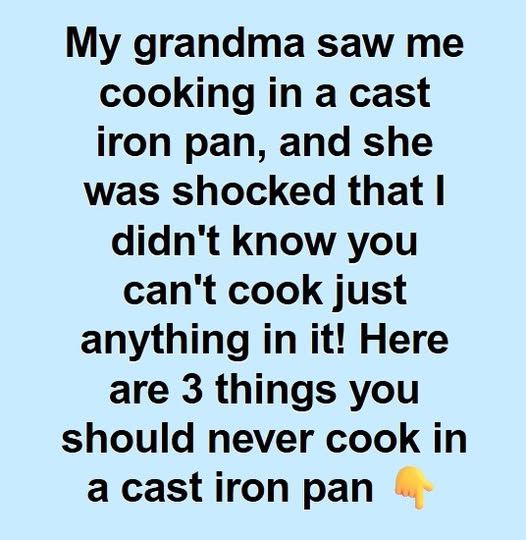


Why I Love Cast Iron—But Avoid These Foods
I’m a huge fan of cast iron. Whether I’m flipping pancakes at breakfast or searing steak for dinner, it’s my trusty kitchen workhorse. Cast iron is durable, versatile, and—when cared for properly—can last a lifetime. But as much as I love it, not every ingredient plays nice with this pan. Some foods can damage the seasoning or even ruin the flavor of your dish.
Here’s one big culprit I always avoid:
Tomatoes, citrus, vinegar—anything highly acidic—can be trouble in cast iron. These ingredients can break down the pan’s seasoning and give your food a sharp, metallic aftertaste. I learned this the hard way after trying to make shakshuka. What should’ve been a rich, comforting tomato-based dish turned into something sour and metallic. Never again!
Pro Tip: Use a stainless steel or non-stick pan when cooking with acidic ingredients. Your taste buds—and your skillet—will thank you.

Fish, blue cheese, garlic bombs—strong-smelling foods tend to linger. Even after a good scrub and a 400°F bake, certain odors just won’t quit. That delicious salmon you made? Great last night, not so great when your pancakes pick up the scent the next morning.
Pro Tip: Use glass, ceramic, or stainless steel when cooking strong-smelling dishes. Your skillet—and your future meals—will thank you.
Unless your cast iron is perfectly seasoned and basically non-stick, eggs are a gamble. They tend to latch onto the surface, soaking up the seasoning and leaving behind a stuck-on mess. Scraping them off isn’t fun—and neither is the cleanup.
Pro Tip: Want soft, fluffy eggs with zero stress? Stick to a good non-stick or stainless skillet.
Cast iron is one of the best tools in the kitchen, but knowing what not to cook in it is just as important as knowing what to cook. Skip the foods above, use the right pan for the job, and you’ll get better results—and a longer-lasting skillet.